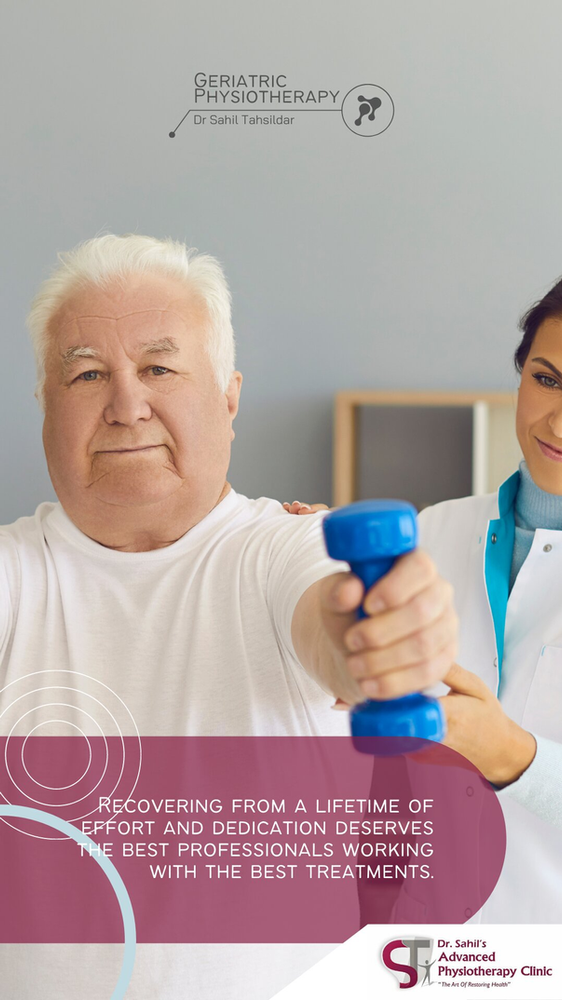Unlocking the Potential of Geriatric Physiotherapy for a Healthier, Happier Aging Experience
Geriatric physiotherapy is another such branch which deals with the welbeing of the elderly patients. As you know age can have a detrimental effect on overall health which can affect your mobility, independence and your quality of life. This blog post will inform you about how physiotherapy can help the older adults and tips for the caregiver who atend them.
Understanding the Aging Process
Daily activities of the aging population is affected by number of age related changes, most common conditions in old age are osteoporosis, osteoarthritis, and Parkinson’s disease. These physical challenges can limit mobility, making it crucial for older adults to maintain their physical health and seek appropriate interventions like geriatric physiotherapy.
Common Conditions in Older Adults
-
- Osteoarthritis: A degenerative joint disease that causes pain and stiffness, affecting mobility.
-
- Osteoporosis: A condition characterized by weakened bones, making them susceptible to fractures.
-
- Balance and gait disorders: Age-related changes can lead to problems with balance, coordination, and walking.
-
- Chronic pain: Painful conditions like arthritis or back pain can significantly impact daily functioning.
-
- Stroke and neurological conditions: These can lead to muscle weakness, paralysis, and difficulties with balance and coordination.
Geriatric Physiotherapy Techniques
A geriatric physiotherapy program focuses on addressing these age-related challenges by employing various exercises and techniques tailored to the specific needs of elderly patients.
These include:
Range of motion exercises: These exercises aim to maintain or improve joint flexibility, making daily activities easier to perform.
Strengthening exercises: Strength training for the elderly focuses on building muscle mass to support the joints and improve overall stability.
Balance and coordination training: Balance exercises are crucial for fall prevention in geriatric physiotherapy. They help older adults maintain their equilibrium and perform daily tasks safely.
Functional mobility training: This aspect of geriatric rehabilitation involves retraining older adults to perform activities of daily living independently.
Pain management techniques: Geriatric physiotherapy also addresses chronic pain through methods like manual therapy, heat or cold therapy, and TENS (transcutaneous electrical nerve stimulation).
Benefits of Geriatric Physiotherapy
Some top benefits of geriatric physiotherapy for seniors include:
-
- Improved mobility and independence: Physiotherapy for elderly patients focuses on enhancing their ability to move and function independently, enabling them to enjoy a better quality of life.
- Reduced risk of falls and injuries: By improving balance and coordination, geriatric physiotherapy exercises can help prevent falls and reduce the risk of fractures and other injuries.
- Enhanced quality of life: With improved mobility and pain management, older adults can participate more actively in their daily lives and social activities.
- Better management of chronic conditions: Geriatric rehabilitation can help manage the symptoms of age-related conditions, enabling seniors to lead more fulfilling lives.
- Increased social engagement and mental well-being: Participation in physical therapy can boost mental health by reducing feelings of isolation and promoting a sense of accomplishment.
Choosing the Right Geriatric Physiotherapist
Selecting the right physiotherapist for elderly patients is essential to ensure a positive experience and achieve the desired outcomes.
Consider the following factors:
-
- Qualifications and experience: Look for a licensed physiotherapist with experience in geriatric care.
-
- Specialized training in geriatrics: A physiotherapist with specialized training in geriatric care will be better equipped to address the unique needs of older adults.
-
- Communication and rapport with older adults: Choose a therapist who can establish a comfortable and trusting relationship with the patient.
-
- Availability of necessary equipment and facilities: Ensure the physiotherapy clinic is equipped with the tools and resources needed to provide comprehensive care for elderly patients.
Tips for Caregivers and Family Members
As a caregiver or family member, you can play a crucial role in supporting the older adult throughout their geriatric physiotherapy journey.
Here are some tips to help:
-
- Encourage participation in physiotherapy: Emphasize the benefits of geriatric physiotherapy and motivate the older adult to actively participate in their rehabilitation.
-
- Support the older adult throughout the process: Accompany them to appointments, offer assistance when needed, and provide emotional support.
-
- Ensure a safe and comfortable environment: Modify the home environment to facilitate mobility and minimize the risk of falls.
-
- Promote an active and healthy lifestyle: Older adults can be encouraged to in involve in regular physical activities , a little push can help them and a balance diet as per individual needs. Which can further increase the impact of geriatric physiotherapy.
At Dr. Sahil’s Advanced Physiotherapy Clinic, we offer geriatric physiotherapy services both in-clinic and at home, assisting elderly individuals in regaining their mobility and independence, resulting in a positive impact on their lives. Prioritizing physical health and seeking expert assistance can greatly improve the quality of life for seniors. Caregivers and family members hold a crucial role in ensuring the success of geriatric physiotherapy by offering unwavering support and motivation throughout the process.

